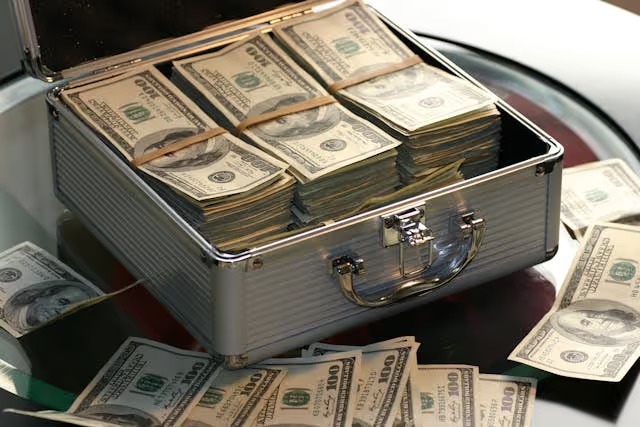
Blog
Why an Emergency Fund Is Essential for Security
Your financial safety net
Life is full of surprises: some delightful, others less so. While we can't predict every twist and turn, we can prepare for the unexpected. Enter the emergency fund: your financial buffer against life's unforeseen events.
What Is an Emergency Fund?
An emergency fund is a dedicated savings reserve designed to cover unexpected expenses or financial emergencies, such as medical bills, car repairs, or sudden job loss. Unlike other savings, this fund is specifically meant to handle unforeseen events, providing a safety net that protects your financial health during uncertain times.
Why You Need an Emergency Fund
The Financial Service Council’s (FSC) 2023 Financial Resilience Index revealed that 39% of New Zealanders, or more than 1.5 million Kiwis, could not access $5,000 within a week without going into debt if they had to deal with unexpected expenses. This figure had increased by five percent from the previous year, showing a worrying trend of decreasing preparedness.
Here are five key reasons why you need an emergency fund.
1. Gain Confidence Through Preparation
“Expect problems and eat them for breakfast” Alfred A. Montapert
Financial stability isn't just about numbers; it's about peace of mind. Knowing you have a cushion to fall back on can alleviate stress and provide a sense of security. Alternatively, it can be stressful to know you’re vulnerable to any disruption to your income, or any unforeseen expenses.
It’s best to be realistic and acknowledge that through the course of your life you will experience the ‘unexpected’. Anyone who’s realistic will acknowledge that ‘unexpected’ things happen and are just a normal (even if unplanned) part of our lives. This could be in the form of:
- Expense issues. For example, a car which has broken down, unplanned travel to see or care for a sick relative, a broken appliance, health or dental costs, etc. Or,
- Income issues. For example, a sudden job loss, your own health issues limiting earning potential, family members health issues requiring you to look after them instead of work, or any other event which leads to a drop in income, and so on.
Having an emergency fund means you're prepared to handle these situations without derailing your financial plans.
2. Stay on Track Toward Your Goals
Whether or not you’ve made a deliberate decision to, you’re working toward a financial goal. For many, this will be funding your retirement nest-egg and for others, it will be buying a first home or repay your mortgage on your existing home.
If you don’t have an emergency fund, then every time you run into a financial issue, you’ll have to spend some or all the funds that you’re investing towards your financial goals to finance these unexpected costs. This reduces the results of your efforts to strive towards the things that really matter and means you’re more likely to lose heart in the things that really motivate you.
With an emergency fund in place, you’ll be able to navigate life’s inevitable storms without accessing funds which are invested and may be difficult to get to, and/or subject to variations in value.
Don’t let a ‘bump in the road’ divert you from reaching your financial goals.
3. Avoid Emergency Borrowing
Lenders charge a high amount of interest for short-term borrowing. Without an emergency fund, borrowing from these lenders for something such as your car breaking down means that over the course of the loan you will be paying a lot more than you initially borrowed.
This includes debt on credit cards, which can quickly accrue interest at very high rates.
An emergency fund allows you to manage unforeseen expenses without resorting to borrowing, keeping your financial health intact.
Related material:
- Who wins in a downturn
- Warning signs you're in financial danger
- Deal with financial uncertainty
- Kiwis spend more on Lotto than on all major fast food outlets combined, how do we better financially empower ourselves?
- How to handle a job loss
4. Protect Your Investments
Some people struggle to build true financial freedom because they use investment accounts (usually retirement funds) as catch-all slush funds. There’s no separation of purpose.
If your retirement fund becomes your emergency fund, car repair fund, go-to account, and holiday fund, you guarantee long-term underperformance. Once you start “borrowing from your future,” it becomes a habit.
Worse yet, financial "emergencies" tend to crop up at the worst possible time. For instance, you might face a job loss during a stock market correction (down market). Selling investments during a market downturn to cover emergencies can lock in losses and hinder your portfolio's growth. This will mean you’ll be forced to “lock in” losses at lower values, rather than ride out the period of depressed valuations. An emergency fund provides liquidity, allowing your investments to remain untouched and continue compounding over time. In other words, you won’t have to sell investments at a bad time.
5. Forge Good Financial Habits
Putting aside some of your income for an emergency fund is a commendable act. Even taking a step which might seem small at first can add up to a great overall result, and the important first step of setting aside funds is one of them.
With any investment or emergency fund, it also helps to avoid accessing it unless something that meets pre-agreed criteria has occurred. It’s best to agree in advance about such criteria with your spouse or other family members. This sort of conversation can also be the start of forming other great financial habits too, such as agreeing on how much and where to invest to achieve the things you really want in life.
How Much Should You Save?
Financial experts often recommend saving three to six months' worth of living expenses in your emergency fund. However, the exact amount can vary based on individual circumstances, such as job stability and possible or current personal obligations.
One of the reasons most financial gurus suggest having enough of an emergency stash to cover three to six months’ worth of regular expenses is because that’s when most people arrange their income protection insurance to kick in, for example, if they become too ill to work.
Naturally, the total sum required differs between each person’s individual circumstances, as well as a reasonable estimate of what emergency costs they may be expected to meet – this means there is no “one size fits all” approach. For a more conservative approach, some suggest saving up to 12 months of expenses, especially if you have dependents such as multiple young children, a lack of income protection insurance, or an irregular income.
How To Build Your Emergency Fund
Here’s how to build your emergency fund, step by step.
- Set a Savings Goal: Determine how much you need based on your monthly expenses and personal circumstances.
- Create a Budget: Identify areas where you can cut back to allocate funds toward your emergency savings, or ways you can increase income which can then be diverted to this fund.
- Automate Savings: Set up automatic transfers to your emergency fund to ensure consistent contributions.
- Choose the Right Account: Keep your emergency fund in a separate, easily accessible account, such as a high-interest savings account.
- Review and Adjust: Regularly assess your fund to ensure it aligns with your current needs and adjust as necessary.
The Bottom Line: Build Your Emergency Fund
An emergency fund is a cornerstone of financial well-being. It provides a safety net that allows you to navigate life's eventualities with confidence and resilience. Having an easily accessible stash means you can pay for such events without interfering with your major financial goals. By taking proactive steps to build and maintain your emergency fund, you safeguard your financial future and gain peace of mind.
Remember, it's not about predicting the storm but learning to dance in the rain.
You may also like:

Law changes make borrowing a lot harder

How to prepare for a home auction


